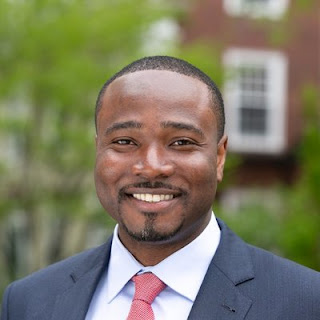Half an Hour,
Oct 24, 2019
Efosa Ojomo, Christensen Institute
Summary of a talk by Efosa Ojomo, Christensen Institute, at eLearning Africa in Abidjan.
The four Ps of education: purpose, problem, practicality, promise.
The porpose: not simply to get people in a classroom, but to improve the human capital of society so they can be productive.
Problem: education is both a means to an end and an end in itself. People celebrate just becase they finish a degree, even if they haven't larned.
Practicality: education is not free, it is expensive. Also, no matter how much you improve education in a region, if people cannot get jobs, you experience a brain drain.
Promise: if we get education right, it can transform the political, social and economic landscpae of a country. Eg. Singapore, South Korea.
Some thoughts from our book....
How much did Nigenrian government spend on education per person: $120. Ivorian government did a bit more. The money these governments have is spent on defence, transportation. The idea that these governments would produce world class education is unrealistic. That's why we need the private sector.
There will be 450 million people of working age in Africa in 2015, but if we continue on the present path, only 100 million jobs.
Three types of innovation:
- market-creating innovation (create new opportunities, democratize access, creates jobs)
- sustaining innovation
- efficiency innovation - eg. making good products cheaper (eliminate jobs, free up cash)
But to support market-creating innovation, you need education, so that people can learn how to work in the new markets.
Innovations in higher education: we think to begin with of elite universities. To expand th market we can create hybrid universities. But to really expand the market we need to focus on skills development, eg., with coding bootcamps. And note that the cost is much lower for a bootcamp, and the education is in many ways more relevant.
Do we need to build 1000 universities, or can we start by focusing on the skills that are needed.
Precedent for this: the United States in the 1800s. They created land grant universities, to halp people capitalize on the new skills for the industrial revolution.
Push versus Pull: pushing well-intentioned solutions rarely works. Eg. I built a well, it worked for 6 months, then it broke. This sort of 'push' approach simply tries to provide needed resources, but there's no mechanism for maintaining what we're building.
By contrast, entrepreneurs wanted to create access to people to have mobile phones. They created a business model that democratized access. So we need to ask: what kind of organizations can we build that help pull education into an economy?
We're building a market-creating innovation lab. The plan: R&D, educate and incubate, connect capital & catalyze.
Until we educate Africa so Africans can build and manage things on this continuent it will be very difficult to build sustainably.




